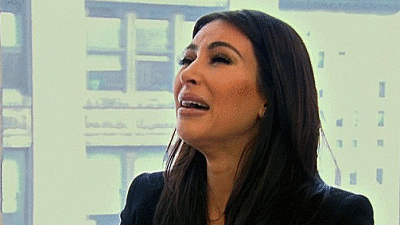Posts by Alyson Shane
My TEDx Speaking Experience, Part I
- by Alyson Shane
 (Image via TEDxWinnipeg)
(Image via TEDxWinnipeg)
Recently I announced that I had been selected as a speaker at this year's TEDxWinnipeg event. This was amazing news to share, but prior to applying to speak I had a lot of unanswered questions:
What was the application process like?
What would happen if I was selected as a speaker?
How would I prepare to deliver my talk in front of a room full of hundreds of people?
What kinds of supports were in place to help me hone my talk and meet TEDx standards?
... and so on. The questions seemed endless.
With this in mind, I was thrilled when the TEDxWinnipeg social team contacted me and asked if I'd be interested in a series of posts about my experience. As a writer and a advocate of knowledge-sharing, this felt like the perfect opportunity to share what I'm learning as I go through this process, as well as the challenges and hurdles come with being selected to speak at a TEDx event.
Below is an exert from my first post in the series:
I’m a writer, and I own a digital marketing agency, so I spend a lot of time thinking about how people interact online. I’ve also been deeply influenced by the people I’ve met online throughout my life, and wanted to speak to those experiences and share them with the audience.
That being said, a good talk isn’t just about telling your own story; it’s about sharing information and ideas with your audience, so I made sure that my talk also focused on the positive power of digital communities in broader, less personal examples, as well. Because while a compelling story is great, a good TEDx talk needs to also introduce an idea or concept, because the talks are about sharing ideas, not just stories.
Check out the rest of my blog post about being a TEDxWinnipeg speaker here.
Elle at the PTE
- by Alyson Shane

There are few things as powerful as a strong one-person performance, and while Severn Thompson's performance in Elle wasn't completely solo, the 90 minutes that she spent on the stage, almost entirely on her own, were appropriately gripping and moving.
Exploring French-Canadian History
Elle is a theatre adaptation of the Douglas Glover’s 2003 novel of the same name which is currently playing at the Prairie Theatre Exchange. The story focuses on the tale of harrowing survival in pre-colonial Canada, and weaves in themes of feminism, magic, and terror into a gripping performance that demands to be seen.
The play, and the novel upon which the play is based, are an interpretation and expansion of the incredible story of Marguerite de La Rocque de Roberval, played by Severn Thompson, a French noblewoman who travelled to Canada and was marooned on the Isle of Demons, a phantom island, an island off the coast of Newfoundland. She was marooned by the captain of the ship, her relative, who dumped her overboard as punishment for taking a lover during the voyage.
Marguerite is joined by her lover Richard, her maid Damienne, and a boat full of broken tools. Discovering that she is pregnant, she struggles through a series of hardships as her pregnancy progresses: Richard becomes ill and dies; Damienne, too, eventually succumbs to starvation and sickness, and, pregnant and alone, Marguerite's spirit begins to break.
A character who began as a confident and aloof young woman is suddenly left to face the harsh Canadian winters alone, and Thomson's portrayal of a woman whose spirit is breaking in front of you is chilling take on dark humour, to say the very least. As she climbs inside the skin of a bear, worn-out, cold, and ready to give up, she is discovered.
Itslk, played by Johnathan Fisher, is an Indigenous hunter who believes that Marguerite is a spirit, having watched her emerge from inside the bear. He teaches her how to hunt and cook meat, and the real and spirit world begin to blend as Marguerite becomes more in touch with her newfound home.
Intimate and Gripping
Being the sole (or largely solo) actor on stage can be daunting, and often falls flat, but Thompson's depiction of a woman going through a traumatic experience and surviving managed to be both alarming and darkly funny. At times, when Thompson is describing their dire state on the island, living off of “books, bird bones and tennis balls” you almost feel bad for laughing as she trounces around the stage.
The most striking part of the performance, however, was how the stage was integrated with the story. The entire play takes place in front of a large structure which resembles a rib cage (an homage to the bear Marguerite finds, perhaps?) and is the perfect play to see at the Prairie Theatre Exchange because of the smaller stage size and the intimate setting.
By using a long sheet and wrapping it in various ways around the structure the stage is transformed from a ship, to a tiny tent, to the belly of a bear, and more. At one point, while Thompson wound herself up inside the sheet, crying out, it could almost be believed that she was truly losing her sanity.
Elle is a play worth seeing, and a reminder of the hardships that faced both colonists and Indigenous peoples alike all those centuries ago.
Write Better Instagram Captions in 5 Minutes or Less
- by Alyson Shane
Instagram is a visual social network by design, which means it's essential to focus on creating and finding eye-catching visuals to help your account stand out from the crowd... but what about the captions?
Many people don't realize this, but captions are one of the best tools at your disposal to help convey your message. Taking the time to write engaging, personal captions which express who you are (business or personal) and your reason for posting can go a long way towards helping keep your Followers engaged.
Luckily, sprucing up your Instagram caption game is as easy as can be! Let's take a quick look at how you can write a better Instagram caption in five minutes or less:
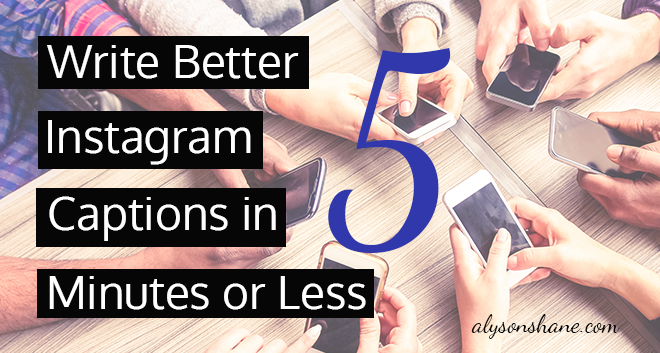
Use Your Instagram Captions to Sound Authentic
Before posting anything on Instagram, ask yourself: why should my Followers care about what I'm sharing? What sets my post apart from other, similar, content on this social network?
Some other things to ask when crafting your Instagram caption are:
- Does it tell a story?
- Does it help my Followers learn more about me?
- Does it sound personal and authentic?
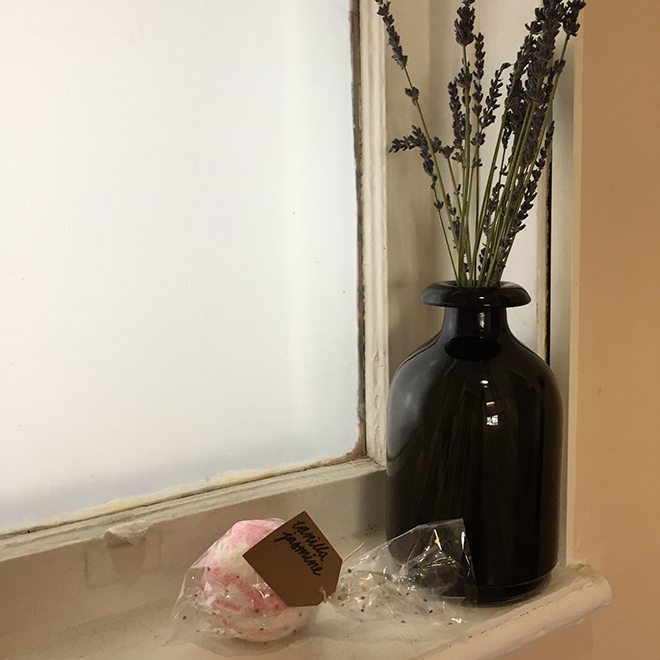
Let's use this photo of some lovely items I picked up from one of my favourite local shops, Public General Store to illustrate an example of what I mean.
Which of these two captions inspires you to take action?
Got some new stuff from @shop_public today. Check them out!
vs.
Yesterday I braved the cold to pick up some treats from my favourite new local shop, @shop_public. The dried lavender makes the house smell amazing, and I can't wait to relax with this vegan, handmade bath bomb from @blackflorawpg after a good skate. Make sure to check them out the next time you're in #WestBroadway!
See what I mean? Now my Followers know where I got the items, the reasons why I like them (local, handmade, vegan, etc), and have a personal recommendation to go check them out for themselves.
How does this example apply to my business? I hear you asking. Here's how:
Consumers demand more authenticity and personality from the brands and businesses that they interact with, the more "human" they want those interactions to feel. By using longer sentences and slang in the caption above it sounds more like... well, me.
I'm a person, and that's how I speak, so it makes sense that a brand wishing to emulate a "human" style would want to adopt a similar tone.
Use Your Instagram Captions to Tell a Story
Gone are the days when a brand could throw up an image and assume that consumers would buy based on the image, alone. Buyers in our modern economy are interested in how products and brands make them feel, and there's nothing that makes people feel good like being part of a story.
With this in mind, ask yourself: how can I wrap my products and posts in a story that will interest my Followers?
(Don't worry: if you're stuck here are a few suggestions to get the wheels in your head turning):
- Share a story about something that happened recently
- Mention specific customers, employees in your caption
- Get personal - share a success or struggle which relates to your image
- Share your favourites (places, people, food, products, etc)
- Talk about upcoming plans, dreams, and events
- Quote books, speakers, or people who inspire you and helped shape your brand
Use Your Instagram Captions As a Call-to-Action
Now that you've hooked your Followers with an interesting, authentic caption it's time to guide them to what you want them to do next. 70% of small businesses don't use a call-to-action in their marketing copy, which means doing so can give you a competitive advantage.
Stumped for a few effective call-to-action examples? I've got you covered:
- Check out the link in our profile for details
- Looking for more decor inspiration? Check out the link in our bio
- Tag a friend who...
- Share your experience/memory with us by tagging us in your photo!
- Leave a comment and tell us what you think
Encouraging your Followers to talk to you, share their stories, and get your brand involved will help with those feelings of engagement and participation in your brand's "story". Not sure how to tell your brand's story? Here's a comprehensive how-to on marketing your brand through storytelling.
Do you have any favourite tips on Instagram caption etiquette? Tweet at me or tell me in the comments!
Why I Marched
- by Alyson Shane
Before I go further, I want to acknowledge that the march I'm discussing was held on Treaty 1 territory.
I mention it because it's important for me to acknowledge that I marched for treatment, rights, and freedoms that many Indigenous people, particularly Indigenous women and girls, still do not receive despite the fact that we marched on their traditional lands.
I also want to preface my post by saying that as a white cisgender female, born in Canada to a middle-class household, with a post-secondary education, I understand and accept my privilege. I do my best to be aware of that privilege and to be respectful and accepting that there are gaps in my perspective, knowledge, and understanding. I want to be clear that my perspective can't (and shouldn't) be representative of, or exclusionary to, others. I also apologize in advance if I unintentionally exclude a specific group from this post - it's not my intention to do so, I am just going to write what I can from the heart in the best and clearest way that I know how.
Without further ado.
Why I marched
I marched because I believe in equal rights. I believe that everyone, regardless of their sexual orientation, gender identity, place of birth, skin colour, mental or physical ability, and religious beliefs should have a place within our society. Everyone has the right to feel safe and respected, and I support a movement which makes equality one of its core principles.
I marched because I stand as an ally behind the LGBTQIA community. I recognize that there are struggles and issues that I can't possibly start to understand due to my privilege as a white cisgender woman, but I stand behind these groups as an ally because I believe that we should be able to love whomever we want, and to have our sexual and gender identities respected and supported by our families, communities, and governments.
I marched because I value our sexual and reproductive rights. I believe that everyone deserves to have access to medically sound, high-quality sexual information and counselling, reproductive care including birth control, and access to safe, legal abortions regardless of their income, sexual and gender identity, race or religious belief. I support helping individuals make well-informed and medically sound decisions about their bodies and sexual and reproductive health.
I marched because I stand as an ally behind minorities and POC. As a white woman I accept that there are struggles that I will simply never face due to my skin colour. With that in mind, I do my best to be an ally to movements like Idle No More and Black Lives Matter. I acknowledge that it is not my place to fight on behalf these groups, but to express my support in the ways which are appropriate.
I marched for our planet. I believe that we have a responsibility to take care of our planet, and to stop putting our convenience and comfort before tackling issues like climate change. We need to end our dependency on fossil fuels and transition to green, renewable energy sources which won't cause further damage the planet and put the future of our species and the rest of the life on this planet at risk.
I marched because I have made mistakes. Opinions grow and change over time, and I know that in the past I have made thoughtless and hurtful comments, and have acted in ways which could have been more kind and well-informed. I am continually doing my best to learn to be an ally, and to learn from my past missteps and do better moving forward.
I marched for my future children. I want to bring children into a world where they don't have to feel ashamed of who they are, what they look like, what their mental or physical capabilities may be, and who they love. I want to be a part of a movement which encourages the best in our society, and which is pushing for a future that I can be proud of.
What can we do now?
Naysayers on the internet and elsewhere have tried to downplay the importance of this movement, saying that it will "die out", "go nowhere" after the initial march has ended, but don't believe them. The cause will only die out if we stop caring about each other and putting in the time and effort to make our voices heard, and that won't happen.
Here are some ways that we can do our part to keep this movement alive:
Acknowledge our privilege
It took me a lot longer than I care to admit to come to terms with my privilege. It's hard and uncomfortable to look critically at yourself and realize the ways in which society treats you differently than other people, but being able to is essential to being an empathetic ally to other groups.
If you aren't sure what any of this means, BuzzFeed has a handy and easy to understand quiz which breaks down some ways in which you may be more privileged than others.
Speak out + listen back
Talk to the people around you about politics and issues that you care about. If you don't feel like you care about any issues, read a few news articles and make a list of the things that you agree and disagree with. Now, google those points and learn as much about them as you can.
Next, ask the people around you what their thoughts are on those topics. Don't be afraid if they're different that yours: instead, look at it as a chance to learn about a different perspective than your own. Ask questions and be curious and respectful, even if you disagree.
Don't be afraid to be wrong, or to admit that you don't know something. Everyone is learning all the time, you and me included.
Get out there
It's easy to be an armchair activist, but until we start getting out from behind our computer screens and showing up to events in our community we can't really begin to understand what other people are thinking and feeling.
Show up to town hall meetings, political debates, free lectures and rallies when you can. It's okay if you don't feel comfortable, and don't know what to say or do. Just showing up and listening is more than a lot of people are willing to do.
If you live in Winnipeg and want a friend to come with you, let me know and I'd be happy to join you.
Did you attend any the Women's March rallies? What were your experiences like? Tweet at me or tell me in the comments, because I'd love to hear from you!
Setting Intentions for 2017
- by Alyson Shane
2016 was a whirlwind year, and now that I'm home from our holiday trip to Windsor to visit John's family I finally have a little time to think, reflect, and plan my next moves for the coming year.
I'm not a big believer in "resolutions" to be honest; I prefer to look at each new year as an opportunity to commit to doing more positive things in general, rather than saying "this year I'll read 50 books!" or "I'm going to enter a bodybuilding competition in 2017" (lols for days).
Below are a few of the intentions I plan to set for the coming year, and some tips to help you set (and really work towards!) your own:
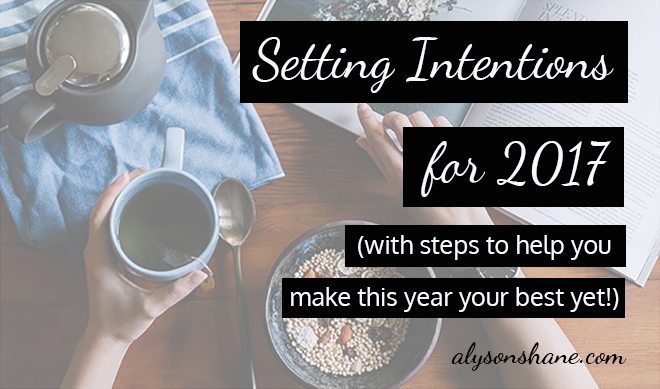
Do more yoga
A few months ago my friend Jackie and I went to Moksha Yoga Winnipeg for some hot yoga, and as I sweated and strained I felt the same kind of runner's high that I sometimes feel during a particularly good run. I left the class feeling renewed, exhilarated, and sweaty as hell, and it was wonderful.
Since then I've been trying to work doing yoga into my regular workout routine; I've been doing this easy 10-minute video at home during my 'lunch break' each afternoon. It's fast, simple, and a good way to break up my workday and spend a few minutes in a (somewhat) zen-like state.
In addition to all the feel-good mental benefits associated with doing yoga it just feels good to connect with my body and stretch out muscles that I don't normally use while sitting at my desk typing to you.
Your turn
Do you have any fitness goals in the coming year? Whether it's taking up running, swimming every day, or just stretching more during your linch break, here are some things to keep in mind:
- Costs. How much are you spending on fitness already? Are you willing to spend more? If you need special equipment, are you willing to invest additional funds?
- Time. Ask yourself honestly: how much time will this take each day, or week? Include travel time, changing, showering, etc in your estimate.
- Other obligations. Saying "I'm going to go to the gym every day!" is great in theory, but harder in practice. Block an average workweek out by hours, including commuting, meal prep, and other daily tasks to see how much time you reasonably have to meet your goals.
Delegate more (effectively)
One of my biggest learning moments came last year when I found myself looking dejectedly at the Crowdfunding Crash Course ebook I had been putting together. I'd spent heaps of time compiling the existing interviews, blog posts, and a bunch of extra goodies into an ebook format, only to totally and utterly lose steam when it came to designing the layout, which I didn't want to do.
I kept putting off the thing I didn't want to do until it felt like I'd put it off too long and the project felt irrelevant. I beat myself up really hard over it, and it's hard even admitting that I let it stagnate. However, it taught me an invaluable lesson: delegate tasks you don't like to the people who can do them for you.
That's why of my personal and professional goals is to delegate more of my workflow to others, and to learn to do so more effectively. Delegating properly and supporting the people who you work with means developing the proper systems to manage everyone's time and keep things on track, which I need to spend more time doing this year in order to meet this goal.
Your turn
Whether you're working in an office, a stay-at-home mom, or a busy business owner, knowing where you need help and asking for it can go a long way towards good mental health. Below are some things you can ask yourself before you start pushing to-dos off your plate:
- What tasks or processes do I enjoy doing the least? We tend to put off and procrastinate on tasks that we don't enjoy. Identify the ones you like the least (doing your taxes, following up with clients, etc) and find people who can help you do them.
- Ask: can I trust this person to do a good job? Take time to talk to and properly vet anyone you're thinking of delegating a task to, especially if it's a business-related one.
- Let go. If you believe that you can trust someone to help you manage your to-dos then trust in their abilities and don't stress too much. Make sure to review everything they do, but give them the space and support to do it properly.
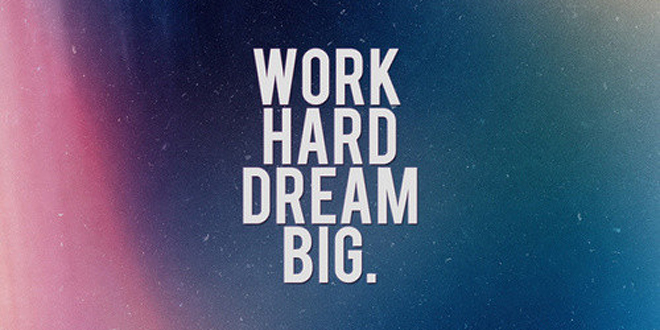 (ooooh yeah, the new year means motivational images like crazy)
(ooooh yeah, the new year means motivational images like crazy)
Spend more time on business development
This dovetails into delegating more effectively; when you run your own business and are managing client expectations, pitching ideas, going to meetings, writing copy, and doing all of the other day-to-day tasks that involve running a business it can be easy to forget about the most important business you manage: your own.
I've asked many mentors and friends about this, and they all agree: the first thing to slip when you start getting busy is your own business development. However, ongoing business development is critical when it comes to long-term success, and in 2017 and the following years I want to make more time to focus on building my business as well as my clients' businesses.
Some steps I want to take in this area are:
- Redefining "work". Most people look at business development as work, but writing and being creative are things that I enjoy, and I need to start re-framing business development as things I like doing in my leisure time when I'm not taking care of clients.
- Delegate more effectively. This deserves a second mention because I struggle with it and it will be essential to finding time for business development. Being too busy blocks my creative process.
- Work in inspiring places. Sitting at home with my laptop on a Saturday afternoon feels a bit boring, so getting out to coffee shops and bars where I can sit and work outside of the house will help me feel invigorated and encourage me to be creative.
Your turn
While my focus is on business development, the steps below are designed to help anyone with a creative passion that often takes a backseat to other things in life:
- Assess the benefits. Write down the benefits of spending time on your project. Some benefits could be "improve my craft or practice", "move my business forward", "earn more revenue" etc.
- Schedule in time. I talk about scheduling a lot because it is the most important way to stay on track. Look at your calendar and block out time to work on your projects or hobbies, and stick to them.
- Find mentors and inspiration. Talk to other like-minded people in your field, join an active Facebook group for people with similar interests, and read blogs and books about your passion or hobby to stay inspired.
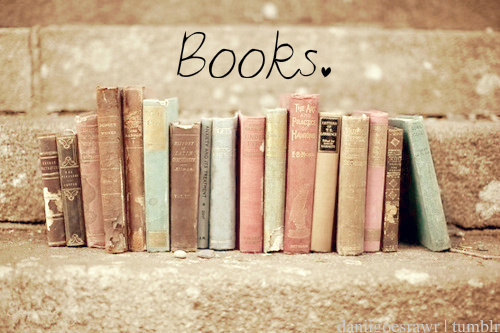
Read more books
One of my favourite things to do is start my workday with a thermos of coffee and the front page of HackerNews (among others). I spend 20-45 minutes every day reading articles, bookmarking important information, and adding to my list of resources.
However, as many of you know there's a big difference between reading several articles a day and reading a good, old fashioned book.
Last year I read about a dozen books, which is pretty good, but I read pretty quickly and honestly there's no excuse other than I've chosen to prioritize other things. This article about finding time to read was a bit of a slap in the face, and has helped me decide to make reading physical books a priority this year.
Your turn
Making time to read more can be challenging (believe me) but below are a few things you can do to make more time to sink into a juicy novel or two over the coming months:
- Schedule in time to read. I find that it's easiest for me to make time to read before bed, after my day is done and I can relax. If this doesn't work for you, make a point to read on your lunch break, during your commute (if you don't drive) or over your morning coffee.
- Make a list of books you want to read and review it often. Fill your list with books by people you admire, interesting fiction (reading fiction makes you a better person), and books that capture your interest and which you are genuinely excited to read.
- Prioritize reading. It's easy to get sucked into an Instagram black hole or get swept up with the latest mobile game, so put your phone face down and store your laptop out of view. Focus on your book (or e-reader) and nothing else for as long as you can. Trust me, it'll be hard at first but the more you do it the longer your attention span will get.
Forgive more readily
Forgiveness is hard. It's easy to stay mad at people, or to hang on to hurt feelings and resentment. I told my therapist today "it's easier to be angry than it is to empathize with someone" and it's true, but hard things are the things worth doing because they make us better people in the long run.
2016 was the year that I started to learn to forgive people: my parents and family who failed me, people who hurt my feelings, acquaintances or strangers who spoke or acted thoughtlessly, and, most importantly, myself. I started to learn to forgive myself.
With that in mind I'm going to do my best to be a positive influence on those around me, and to learn to forgive more easily and not hold onto anger, resentment, and guilt.
Your turn
It seems like everyone has an axe to grind with 2016; whether it's the loss of a favourite celebrity, a personal issue that you haven't resolved, a conflict with a coworker, or something else, below are a few ways you can move towards forgiveness this year:
- Accept that you can't change people. Many of us spend heaps of time stressing and worrying about other people (myself included) but the key to letting go is to accept that you can't change how people think, feel and act. You can only do the best you can and hope that others understand your actions.
- Stop creeping. Social media has made it easier than ever to "check up" on people, but opening up that Incognito tab only helps hold on to any negative feelings you may be harbouring. It won't make you feel any better, so just don't do it.
- Recognize that you're doing the best you can. You aren't perfect. You'll say awkward things, unintentionally hurt other people's feelings, and misstep because you're human. It happens, so do your best to say "I made that mistake, but now I know and I can do better next time."
What are your intentions for 2017? Tweet at me or comment below and let me know what you're doing in the coming year.
A Letter to My University Self
- by Alyson Shane
Earnest inspired today's post with the project of sharing some thoughts about university life, and writing a 'letter to my college self.' (As a student loan refinancing company, they have some great advice about the financial side of your University experience as well.)
It's weird to think that it's been six years since I started university. So much has changed, and things have worked out in unexpected and amazing ways. I remember being so anxious, so scared, as a student, because I worried about where my life would lead me.
Which is why I decided to pen this letter. It's to myself, at 23, as I was about to start my first year at the University of Winnipeg. Below are some things that I wish I could go back and say to myself:

Dear Alyson
I'm writing to you to address some of the fears that I know you're having right now. Leaving your "safe" government job to pursue your education has been a difficult and emotional process, and there have been a lot of moments of anxiety and uncertainty leading up to this point.
But you're here now, and here are some things that I wish you could take forward with you. Maybe they'll make those moments of doubt a little less overwhelming:
University is Not Like in the Movies
You know how most movies and TV shows portray university as being this coming-of-age, self-discovery and self-actualization process? It's not really like that at all.
The tight-knit groups of friends are the ones who are in specific programs, or already knew each other from high school. At 22, you'll be older than most of your classmates. Every time you walk into a new classroom, you'll be walking into a room of strangers.
This is going to terrify you.
But eventually you'll get used to choosing to sit wherever you want; you'll start to feel more comfortable asking to join tables of students; you'll speak up in class because you don't worry about "sounding stupid" in front of your friends, which will soothe your anxiety.
There are times that it will be lonely, but soon you'll come to relish your spares in-between classes, writing in one of the library hallways with the floor-to-ceiling windows, watching the snow fall. The times where you were forced to be self-directed and independent will help shape how you feel about yourself in the future.
It won't be what you expected, but that will be okay.
Your Career Will Work Itself Out
There was a quiet dread which hung over my university years.
After a few exams I established that I was, in fact, smart enough to be in university (something which has been expressed to me several times by other people) but a lingering fear held onto me for my remainder of my time as a student:
What was I going to do after I graduated?
For most university students, this isn't a huge problem; most people live with their parents while attending post-secondary, but I wasn't afforded that luxury. I was pretty lucky as a student: I managed to find some decent paying jobs with flexible hours during the school year, and always managed to find some full-time summer work, as well. But after university... that big, looming space full of uncertainty sometimes felt like too much to bear. I struggled to determine what I wanted to do, exactly, and where.
It will work itself out in the end. You'll have a few ups and downs, and learn a few heard lessons along the way... but eventually you will develop the confidence and self-awareness to shape your own career and not depend on employers for your self-worth.
You will wind up running your own company, and you'll fall in love with the hustle and excitement and ever-changing nature or business. It will work itself out.
Enjoy Your Time as a Student
University was the first time I enjoyed being in an academic setting. Growing up I was told repeatedly that I was lazy and unmotivated, and that I should give up on any thoughts of attending university because I wasn't smart enough to do well.
You're going to feel anxious and stressed at first, but eventually you're going to fall into the natural ebb and flow of classes, homework, exams, and studying each term. You'll come to appreciate the excitement of a brand new class with a new professor, the feeling of finishing a term paper, and handing in an exam at the end of the year.
Most importantly, make sure to take time to yourself during the day. Find a quiet spot in the library, or on some remote nook or cranny in Wesley Hall. Spread out your snacks, your water, your homework, and enjoy the feeling of happy solitude that will often wash over you during these moments.
Being a university student is like being in a little world of your own. It's not quite high school, and it's certainly not the professional working world, and though you won't fully grasp it at the time, the experiences and time that you have will help build your confidence and independence in a way that nothing else in your life will have allowed to date.
It's Going to be Worth It
The single most defining thing that came from my time as a university student was that I learned to believe in myself.
I know that you don't believe in yourself right now; you feel like it was a fluke that you got accepted in the first place, and I know that impostor syndrome will plague for years after you earn your diploma.
Completing university didn't magically transform me into the person that I am today, but, looking back, it was a stepping stone along the path to believing in myself.
Stay strong,
Alyson (Your Future Self)
Do you have anything you wish you could tell your younger self? Tweet at me or let me know in the comments!
Why We Need Twitter (or Something Like It) More Than Ever
- by Alyson Shane
For myself, and many people that I know, the world feels like an unfamiliar place right now.
The recent election of Donald Trump in the United States, and the apparent rise of white nationalism, anti-feminism, Islamophobia, homophobia, antisemitism, etc. (also known as the "alt right") has many people feeling scared and confused, and a lot of articles, from WIRED to Mashable, have emerged recently about the "echo chamber" that social media, particularly Facebook, has created which has led us to where we are today.
With that in mind, I wanted to discuss some of the ways in which I believe Twitter is actually getting things right in terms of providing a non-insular opportunity for people to express themselves, easily find dissenting viewpoints, and engage with them in conversation.

Before we begin
I know that there are a lot of dissenting views out there about Twitter, and it's usefulness as a social platform. Before I go too much further, let me get these things out of the way:
- Yes, I know that their CEO is wildly unpopular
- Yes, I know they have had issues addressing harassment and hate speech in the past
- Yes, I know that their value has tanked
- Yes, I know they have issues acquiring new users
This post isn't about any of those things.
What I'd like to do is discuss some of the things that make Twitter an important and necessary platform for our society right now, and how it (or something with the features I'm going to highlight) must continue to offer in order to allow for citizen journalism, the sharing of thoughts and ideas, and discussion online.
Hashtags (that people really use)
This morning I got up and read (on Twitter) that the cast of the Broadway musical Hamilton delivered a speech to United States vice-president elect Mike Pence at the end of their show last night. Within a few hours, right-leaning Twitter users took to the social network to start pushing a hashtag called #BoycottHamilton, urging (rather obviously) Trump supporters to boycott the play.
The fact that a hashtag emerged isn't what's important, but what you see when you click on the hashtag is:
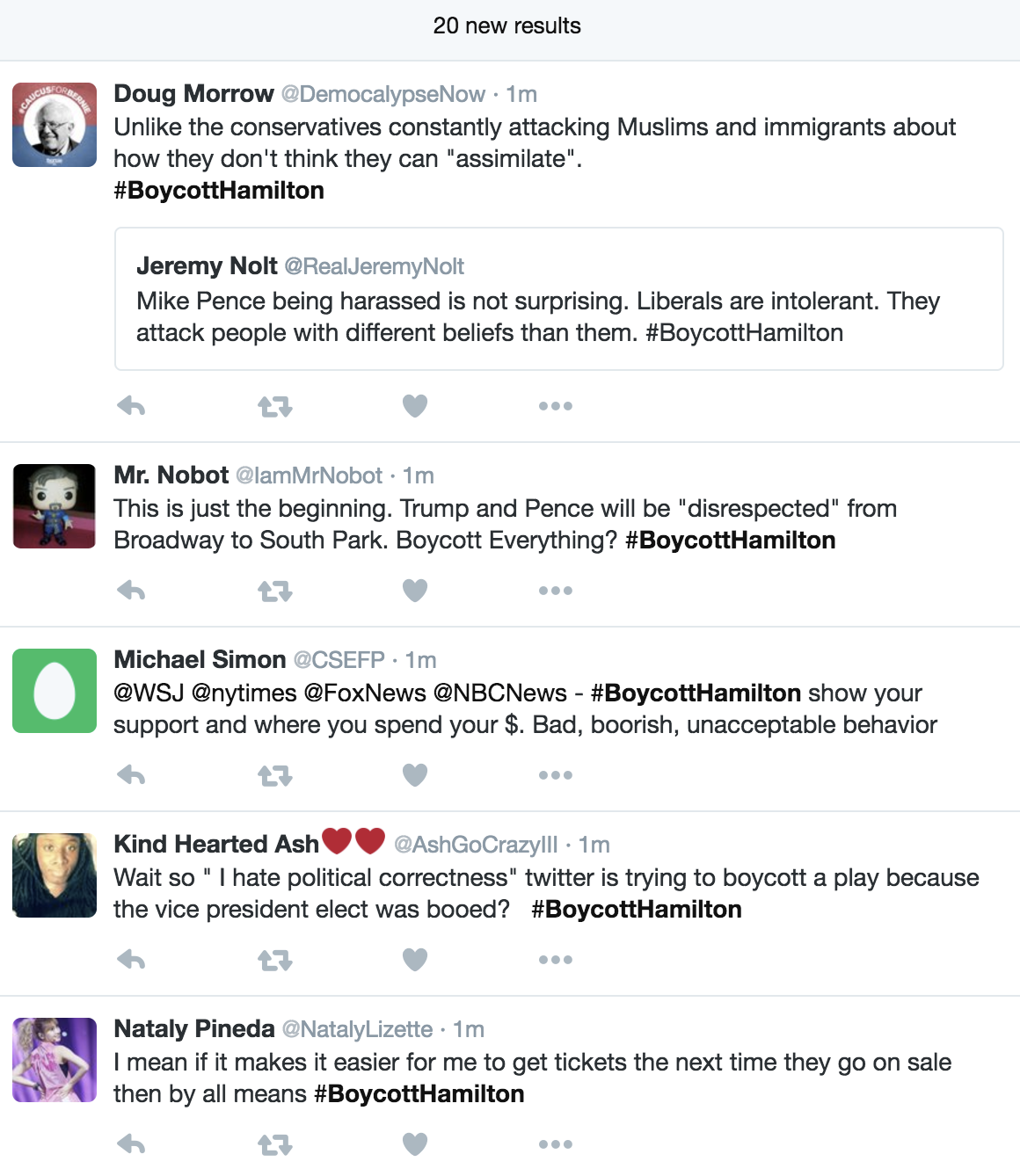
Even in this single snapshot we see a series of diverse opinions. Some don't take it seriously, some are worked up, etc. Not only does a timeline around a hashtag display diverse opinions, but Twitter also offers you this added level of engagement with a hashtag's tweets:
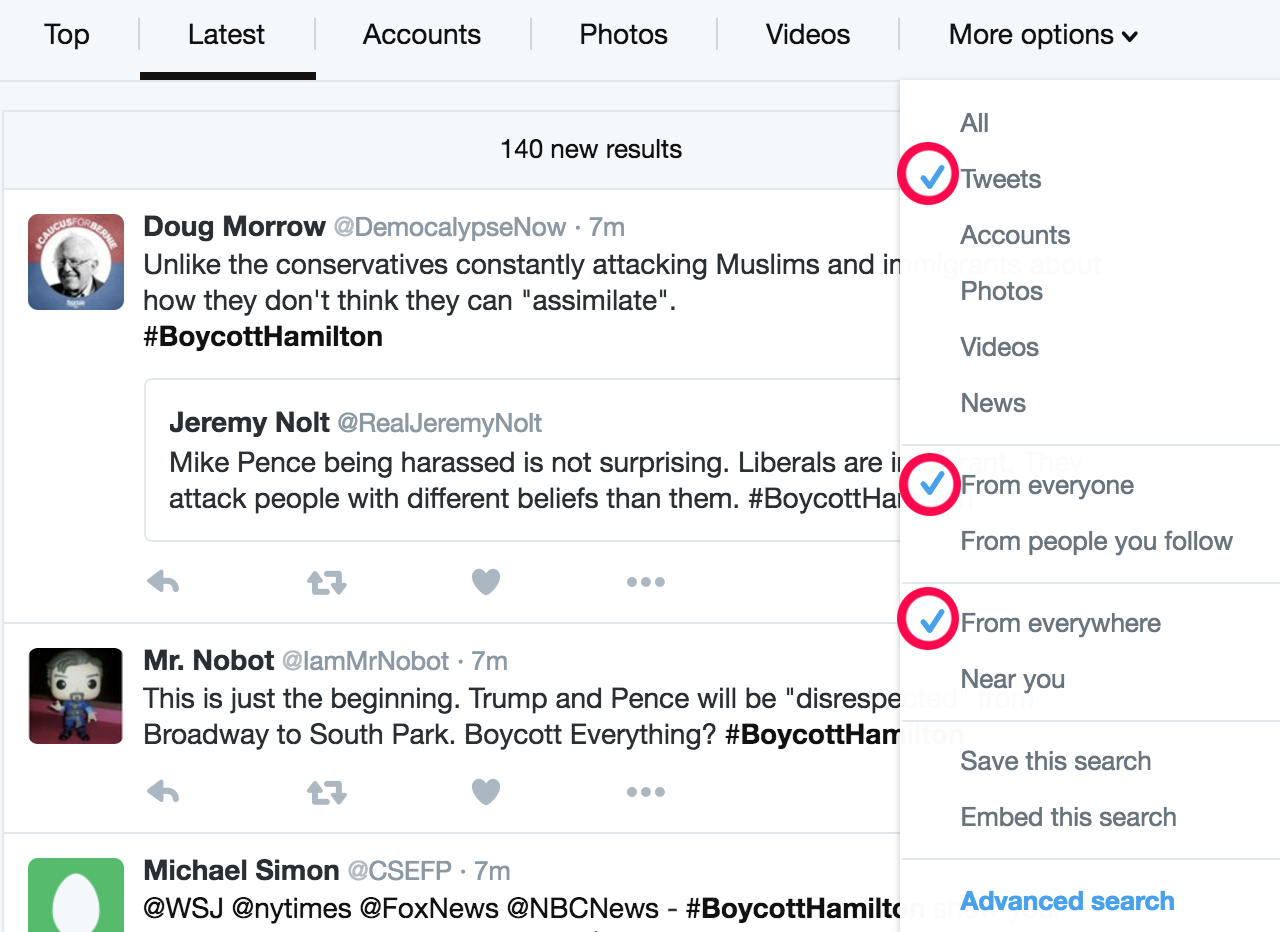
These settings are on by default. This means that in order to find yourself inside a Twitter echo chamber, you literally have to take the necessary steps to insulate yourself against opposing viewpoints.
Compare this to Facebook, which deliberately shows you news items and articles that appeal to you and goes out of their way to make changing those settings a challenge. Yes, hashtags are available to use on Facebook, but according to a 2016 BuzzSumo report, posts without hashtags received more interaction than posts with hashtags. This means that not only are hashtags not popular in Facebook, but that including a hashtag in your post actually lowers the likelihood that someone will engage with it.
So not only is Facebook pushing appealing news at you, but the primary tool at your disposal to find dissenting voices (a hashtag) are rarely used. This means that in order to find different opinions you either need to already be Facebook Friends with someone who disagrees with you, or you have to already subscribe to a Facebook Page or Group where you're likely to hear dissenting views.
But even in that scenario, you still have to actively seek it out, Like, and in some cases apply to join, a Group or Page which espouses views that you disagree with. Then, once you start expressing your opposing viewpoints you encounter the next hurdle: the wall of text. Which brings me to my next point:
Character and post length
Algorithms aside, one of the biggest differences when it comes to hearing opposing viewpoints online, and actually paying attention to them, is that Twitter forces you to be brief, at least in the context of a single tweet.
On Facebook there's no character limit, which means people can (and do) go on ad nauseam to explain their point of view. There's nothing inherently wrong with this, but it highlights the difference that Twitter acts like a conversation, while Facebook acts like a soapbox.
Being on the receiving end of a "Twitter storm" sucks; I can tell you from experience. But it's much easier to process and digest someone else's point of view in 140 characters than digesting (and responding to) several massive paragraphs (or, if you're unlucky, a single monolithic wall of text.)
Tweets, for all their faults, force people to break up their thought process, which provides opportunities for others to interject, respond, and get involved without having to unpack multiple paragraphs of text. I've engaged in debates with people on Twitter over a specific hashtag and more often than not both sides receive support from people who happened to see the conversation, and wanted to participate.
On the flip side, Facebook allows comments to be up to 63,206 characters in length, according to a 2016 HubSpot article. To put that into context: the average book is approximately 500,000 characters, meaning you can fit an entire novel in 9 Facebook status updates.
Just because tweets are shorter doesn't mean that they won't get ignored, or fluffed off, but when a Facebook user replies with a wall of text, a common sign of trolling, it's much easier to dismiss or simply ignore it.
Encouraging conversations
One of the points that I made earlier was about hashtags, and how searching for a hashtag meant that you could easily find differing opinions. It's also important to note that including a hashtag in your tweets also means that other people can easily find you.
Tweeting about a topic like #BlackLivesMatter, #Election2016 or #MAGA (to name just a few) will not only bring like-minded users out of the woodwork, but it's almost guaranteed that someone from the other side of the political spectrum will tweet back at you.
Tweets which include hashtags are 33% more likely to get retweeted than those that don't use them, and this (somewhat older) article from Sysomos which examined over 1.2 billion tweets in two months, which states that "29% of all tweets produced a reaction - a reply or a retweet. Of this group of tweets, 19.3% were retweets and the rest replies."
This 2016 report found that Twitter accounts for 30% of all global social sharing. At 500 million tweets sent each day (or 6,000 tweets every second), that's a lot of replies and retweets, even if Sysomos' 2010 numbers haven't grown since the article was published.
Not only does voicing your opinion on Twitter increase your chances of interacting with someone who disagrees with you, but when a discussion is retweeted, its visibility becomes amplified too. As more users participate, it increases the likelihood that you will run into someone who disagrees with you even more.
Default "public" profiles
Transparency is, in my opinion, the defining feature which makes Twitter such a powerful tool for discussion: when you tweet at someone your reply is completely public.
Unless you go out of your way to change your Twitter profile to "private," your entire tweet history including replies, retweets, quotes, and media will be available for any one whether they are logged in to Twitter or not. And if a tweet is retweeted, even deleting it later won't delete the retweet copy.
Facebook, conversely, was designed to be a more exclusive experience. From day one Facebook's defining feature has been a user's ability to selectively choose who can see what they share, and, for the most part anyway, the conversations you are able to have are limited to the amount of Facebook Friends you've approved, or the number of Groups or Pages you Like or participate in.
While the average Facebook user's Timeline isn't completely private (posts which tag other users, for example, will show up unless otherwise specified) and their comments may be seen if another user's privacy settings are more lax, overall what you say on Facebook isn't immediately available to the public in the same way that Twitter's Timelines are.
Yes, people are can be "outed" if they say something that another user disagrees with, but unless the person is a celebrity, political figure, or person of interest, the average user isn't going to re-share a hateful comment their coworker made and say "I never realized that so-and-so in Accounting was such an antisemite!"
We just don't call each other out in that way on Facebook at a personal level, and on Twitter, we don't really need to, because whatever a user posts is readily available to the world at large.
Easy access to a variety of opinions
Until recently, when we examined a specific historical event or time we had a limited number of sources to draw from. Nowadays, social media allows us to look into the life of the average person and experience, sometimes in real time, what they are experiencing.
Probably the most memorable of these incidents was the Twitter coverage of the protests over the 2009 Iranian election. Foreign media had been banned from reporting, and the stream of live coverage from everyday citizens on the ground led to a request from the U.S. State Department to put off scheduled maintenance which would have caused an outage in Iran during the protests.
Twitter provided the world with access to real-time information about a national crisis, and ever since has become the go-to source for breaking news including weather, political uprisings, and more. But it does more than just give us "on the ground" access to important events; it allows for public scrutiny of the facts, so that while false information will still get around, corrections have the chance of spreading in realtime too.
By using hashtags to discuss a common theme or event, Twitter users are able to contribute to a global and multi-faceted real-time narrative about what's happening in the world that they live in. Clicking on the hashtag they're using will show them a diverse array of opinions on the topic.
Here's another screenshot of some of the 'Live' #BoycottHamilton tweets:
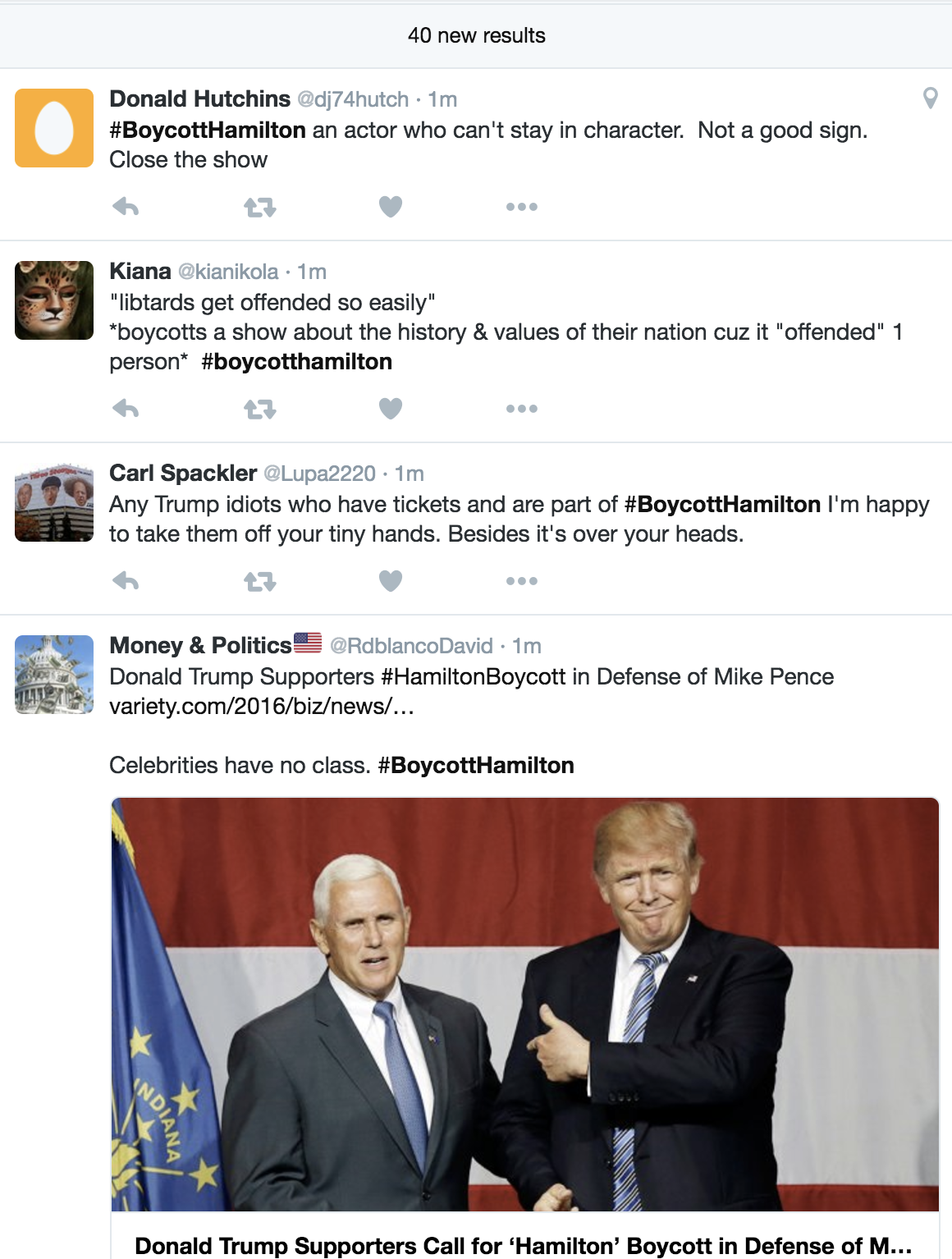
In closing
To be clear: I don't think that Twitter is the perfect platform. It has its share of flaws and issues, and eventually something will come along to replace it (hence the title of this post).
However, I do think that it's important to discuss the elements of the social network which I think make it good, and relevant. Twitter is an important tool for discussion and news, and provides more opportunities for users to engage with people outside of their "echo chamber."
Now, more than ever it seems, we need to be able to hear what other people have to say.
In My Community: Mom's the Word at the Prairie Theatre Exchange
- by Alyson Shane
I'm not going to lie to you: I had some reservations about seeing this play (for those of you that don't know, I've been no-contact (NC) with my parents since February of 2015.)
As a result, the idea of seeing a play about motherhood - something that I have yet to experience, and have thus far only really had negative experiences with - gave me some anxiety. I wasn't sure if I wanted to see the play because I worried that listening to stories of motherhood - of love, of unconditional caring and support - would hurt too much.
However, I also realized that it would be a good opportunity to face a fear (and support the Prairie Theatre Exchange*, which I'm always happy to do), so off we went to check out Mom's the Word.
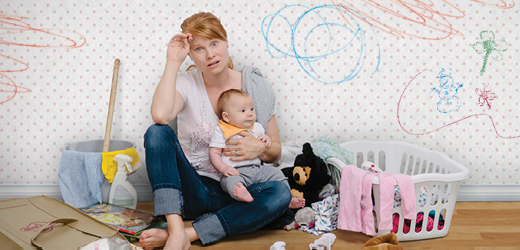
Image via PTE
A play by moms, for moms
Mom's the Word was conceived by a group of actresses and moms living in Victoria, BC in 1995, who all came together to share their stories of the trials and tribulations of motherhood. Together, they pooled their experiences and stories to form a cabaret-style, musical-ish play of sorts which touches on a variety of issues, including: postpartum depression, diapers (and diaper bags), panic, discipline, sex, changing bodies, and much more.
The play opened with a monologue from Jill (played by Yumi Ogawa) about childbirth which was... terrifying, to say the least. I've never had children, but I hope to someday, and seeing such a raw performance of the anxiety, stress, and sheer animalistic power of birthing was a bit unnerving. But, at the same time, it felt oddly inclusive; like this was a trial that every mother goes through, and an experience that is uniquely female.
One of the other mothers, Robin (played by Lisa C. Ravensbergen), gave a hilarious monologue in which she described how she and her equally foul-mouthed partner accidentally taught their child to swear at an early age.
"I tell people he's just saying 'truck' and can't pronounce it properly" she laughs, looking exasperated and embarrassed. This hit home: both John and I include "colourful words" in our everyday vocabulary, and have no shame about it, but the outside perception that we may teach our kids "bad words" too soon in their lives, and be judged for it, is something I've thought about. It felt like such a relief to hear someone addressing it!
Women supporting women
The thing that I loved the most about Mom's the Word, though, was the focus on empowerment through storytelling. Motherhood (from what I can tell) seems like it can be a tremendously isolating experience at times, and it was encouraging to see the moms in the story reaching out and supporting one another.
These struggles were covered really well in the monologues delivered by Jill's character. Over the course of the play she narrates 'letters' to her husband, trying to explain and make sense of the different experiences they're both having (staying at home with the kids vs. maintaining a demanding career) which were, at times, utterly heartbreaking.
"How can I explain what my day was like to you?" she asks "most of my day is spent in silence; how can I put the look our baby and I shared into words?" As John, who came with me, gripped my hand I realized that these were going to be very real issues that I would one day have to face and make sense of, myself.
 Image via CBC Manitoba
Image via CBC Manitoba
Laughter as medicine
The play wasn't all sad monologues and stressing out about dirty diapers; in fact, Mom's the Word presented the topic of motherhood in unabashed, shameless, hilarity.
In one scene, Alison (played by Trish Cooper) walks onstage jiggling a carrier as she tries to lull her infant (who was born prematurely) to sleep. Her baby falls asleep, but her muscle memory causes her to keep jiggling for several minutes as she addresses the audience. In another, Deborah (played by Jenny Wasko-Paterson) struggles through oral sex (taking bites of a banana onstage) as she says things like:
"I still want you to feel good"
"Oh no, I don't mind. I feel sexy when you feel sexy..." *eye roll*
This monologue is clearly demonstrating the struggles that many moms have with reconciling how tired, worn-out, and unsexy they feel, and the struggle to maintain a sexual relationship with their male counterparts who aren't feeling the same strain. Again, this is an area that worries me as a potential future-mom, and I appreciated that it was addressed and normalized within the context of the play.
The stand out scene for me, however, was one in which Deborah's character took her young son to the local pool. Her interactions with the toddler-age child, the fumbling, the mess, and the hilarious antics which ensued reminded me so much of being a young person, and spending my summers in the daycare my mom ran out of our house, which was always filled with toddlers exhibiting the exact behaviours described in the play.
As someone who doesn't yet have children and has a lot of mom-related baggage, Mom's the Word struck a series of chords that I didn't realize where inside of me. Yes, it was hard to watch some points, but the actors put words to many of the fears and anxieties that I have about motherhood, and presented difficult and stressful scenarios as ones which felt relatable, even to a non-mom like me.
Mom's the Word reassured me that, even if the world of parenting is going to be 'trucking' hard sometimes, at least I'll be able to laugh about it.
----
Mom's the Word is currently playing at PTE until November 27, 2016.
* Disclaimer: I get free tickets to see plays at the PTE in exchange for writing these reviews (it's wonderful)
Debunking 3 Popular Social Media Myths
- by Alyson Shane
When it comes to social media, there's a wealth of information out there. A quick Google search for "social media tips" comes up with over 166,000,000 results. That's a lot of information!
Especially when you're first starting out, it may seem like there are so many "dos" and "don'ts" in terms of building an effective social media strategy, but while there are lots of great tips out there... I'm sorry to say that there are also a few myths which need to be debunked and removed from our collective memory.
What kinds of myths am I talking about? Let's take a look:
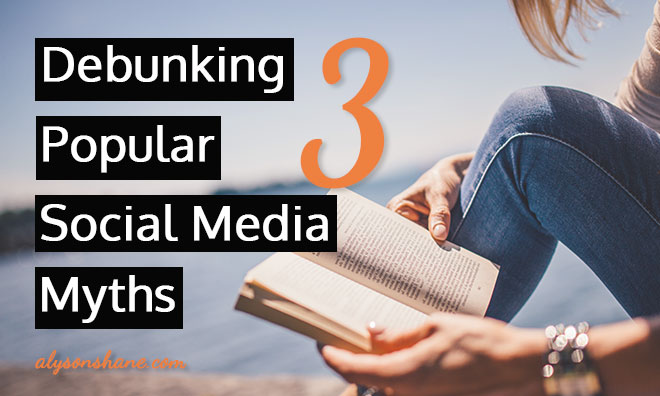
Myth 1: There's only one "right" time to post
This myth continues to exist because it's a well-intentioned one. Of course you want to post your content at times when your audience will be most likely to see it, right?
This is absolutely true, but what you need to keep in mind before you start pre-scheduling your content to go out every Tuesday at 4:45pm is this: do you know that that's when the majority of your target audience will be online?
This might be easy to figure out if your target audience happen to live in the same city as your business (if you're a local restaurant, for example) but if you're trying to reach a wider audience, and one which may even be in a different time zone than you are (say, if you're an international chain of restaurants) then you need to spend a little more time thinking about when they'll be online.
Myth 2: Your business needs to be on every social network
Often, one of the first things that a new client will ask me is: do I need to be on every social network?
The short answer, and the one I always give them is: no.
While it may seem like a good idea to get your name on as many social networks as possible, what you need to consider is the quality of the conversations and content that you can have on each network, not the quantity of them available for you to use.
it's also important to think about the kinds of people you want to reach, and where they spend most of their time online*. According to SmartInsights, 57% of Snapchat users are 16-24, whereas only 25% of the same demographic are regular Facebook users, and a paltry 29% are on G+.
So if your business is trying to target young people, Facebook and G+ may not be the best place to focus the majority of your marketing efforts.
Take the time to think about where your target audience are spending their time, and how your business can establish a presence on those social platforms. Otherwise, you'll just be wasting your time trying to connect with customers and clients who aren't interested in what you have to say or offer them.
Myth 3: You need to blog every day
Blogging is one of the most valuable tools at your businesses' disposal: it allows you to explain, in as much detail as you'd like, what your brand values are, what you offer your customers or clients, and your thoughts and insights in your industry, which can be helpful to your readers.
However, posting multiple times a day, or even multiple times a week, can actually damage your readership and reduce the flow of traffic to your blog.
Why does this happen? In a way, it's twofold: firstly, scarcity creates value. If your followers see that you're posting multiple blog posts every single day, then it's pretty likely that they will stop clicking through to read them because you're inundating them with information.
Secondly, people know that good content takes time to write, and if you're churning out blog posts faster than your readers can hit 'refresh', then it's pretty likely that the quality of the things you're saying isn't as high as it could be.
Instead of trying to post every day, aim for 2-3 posts a month of well-researched, well-documented content that will really help meet your readers' needs.
Did I miss any myths that need to be debunked? Tweet at me or tell me in the comments!
The Catharsis of Crying
- by Alyson Shane
How many times did you cry this week?
I cried 4 times.
- On Tuesday: I felt overwhelmed with my workload for the week (short weeks are hard.)
- On Wednesday: I was thinking about my Grandma, and was excited about seeing her this Christmas.
- On Thursday: In therapy (obviously.)
- Today: Watching this interview with Gord Downie and realizing how short my time with the person I love might be.
This used to be something that I was embarrassed about, but over the past few years I've come to accept that crying is just part of my existence. I used to fight it, and try to hold the tears back whenever they came, but these days I just let it out.
It's the best thing I've done for my mental health, if I'm being honest.
A Cryin' Shame(ing)
When I was growing up, my family members made fun of me for crying so much. I've always been moved to tears easily; the second something tugs at my heartstrings - good or bad - my eyes well up. My aunt once told me that she "worried that I was depressed" as a teenager because I cried at the drop of a hat.
In our household, crying was seen as a sign of weakness and something to be ashamed of. Allowing other people to see real manifestations of your feelings wasn't appropriate, and we were regularly warned against the dangers of sharing our thoughts and feelings with other people.
I remember, once, after a breakup in high school, I was crying in my room and my mother popped her head in to see what was wrong. I said "I'm so sad" and she replied by saying "I hope you don't act this way in front of your friends, or they'll start to get tired of hearing about it and stop being friends with you."
My family, which is of British descent, subscribes to the "suck it up" mentality: publicly displaying emotions of heartbreak, sorrow, or anything other than the status quo was always strongly discouraged, and my brothers and I were shamed and often belittled whenever we allowed our emotions to "get the better of us."
But in the last few months and years I've allowed myself to start getting over those fears. When I feel overwhelmed (which is often, running a business is a scary and often stressful undertaking) I just allow the few tears to come, and then wipe them on and move on with my day.
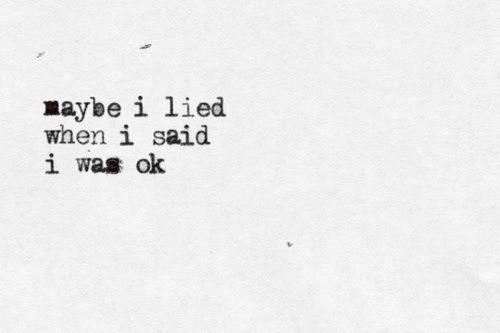
Anxiety and Crying
I have anxiety.
Anyone who has ever felt anxious knows that the plethora of negative emotions that come with it can often feel completely overwhelming, and for a long time I felt guilty because I used crying (secretly) as a coping mechanism. I cried in bathroom stalls and in my apartment when nobody else was home. When I was a kid I would go for long, extended walks through my neighbourhood because I didn't want my family to see or hear me crying.
For years, whenever I cried, or felt like I was going to cry, I would shame myself and feel guilty for not being able to prevent it.
I can't control my emotions.
I'm immature because I need to cry.
I'm not a good person because I cry easily.
However, in therapy (and with some supports from my friends and partner) I've come to realize that crying is just a part of life, and is a normal part of being in touch with my emotions. I used to feel guilty and get upset whenever I cried because I was trying to hide from my own thoughts and feelings, and I am so done with feeling guilty over crying.
Crying and Coming Together
The thing that's changed the most for me, and what led me to write this post, is that crying in front of other people has had the opposite effect from what my family told me it would: it's brought me closer to them.
John and I cry in front of each other regularly. Often, when we talk about our lives, our families, or our feelings for each other, one or both of us will start tearing up. Sometimes, when I talk to my friends about my anxiety, or things that are challenging me, I shed a few tears. And you know what? They don't hate me for it, and it doesn't make them want to be my friend any less.
In fact, knowing that I can be open with the people in my life in such a deeply personal way has been illuminating and life-changing. I can be myself; my sometimes-sad, anxious, messed-up self, and I can cry about it and be honest about it and it's the healthiest change that I've made in a long time.
Benefits of Crying
In fact, crying is actually good for you. Here are a few reasons why:
- Tears remove toxins. Tears actually remove toxins from our bodies. Tears help humans remove chemicals that build up during emotional stress.
- Crying relieves stress. Ongoing levels of stress can increase your risk of a heart attack and can damage your brain, and crying can help alleviate those stressful feelings.
- Crying lowers your blood pressure. Crying has been found to lower blood pressure and pulse rate immediately after a "big cry."
- It reduces manganese in the body. Crying reduces the body's manganese level. Manganese is a mineral which affects our moods, and is found in up to 30 times greater concentration in tears than in blood serum.
- Crying means you're human. All mammals' eyes are moistened and soothed by tears, but humans are the only mammals who express tears as a response to emotional stress or stimuli. Tears (and showing emotions) motivate us to empathize with each other, which encourages us to work together and survive.
So you know what? The next time you're feeling overwhelmed, or really happy... just cry it out. Hell, ugly cry if you must. There's no shame in it (as I'm slowly learning), and it's actually really good for you to cry it out sometimes.
Here's to a good cry!
